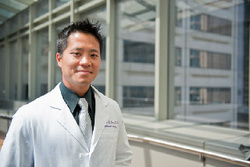
Smokers’ bones take longer to heal, a fact that’s led to the theory that nicotine in cigarette smoke is the main inhibitor. But with recent evidence suggesting it may not be the only culprit, Wellington Hsu, MD, assistant professor in orthopaedic surgery, is back in the lab looking for answers.
“For a healthy person with good vascular supply, bone healing occurs without any sort of problem,” said Hsu, a spine surgeon. “But for a subset of patients, especially those who smoke, doing an orthopaedic or spine procedure is a lot more challenging because the rate of complication is higher.”
Rather than explore the possible linkage to nicotine, Hsu’s research is focused on the dioxin, TCDD, a component of cigarette smoke. With smokers in particular, wound healing and bone regeneration are major issues.
“It is well known that smokers have poorer outcomes for a number of reasons, including poor vascularity and toxins from cigarette smoke that can deposit in human tissue,” Hsu said. “Our lab is looking at the effects of TCDD and our preliminary evidence demonstrates that when subjects are exposed to the dioxin, their ability to form bone is compromised.”
Although TCDD is present in small amounts in the environment, it exists at high levels in cigarette smoke. Elevated TCDD levels in the body have never been linked to anything other than cigarette smoke and the military compound Agent Orange. Hsu remains encouraged by his research, with some in vitro studies suggesting that the toxin down-regulates certain genes that are important for osteogenesis, or bone healing.
As long as the predominant theory is that nicotine is the main cause in the disruption of bone healing, many surgeons will continue to advise that even supplements like a nicotine patch can’t be used after surgery. Without such aids, no-smoking compliance rates decrease as smokers are forced to give up the habit cold-turkey. Hsu believes that if his research establishes TCDD as the root cause, nicotine supplements would be OK for patients to use, likely increasing no-smoking compliance rates and outcomes in the process.
“But the big thing is that if our theory is true, that this toxin is the real key to bone healing, a person would have to stop smoking at least a couple of years before a procedure to regain full bone-healing capability, because the half-life of TCDD in humans is projected to be seven to 10 years,” said Hsu, who works alongside his wife, Erin Hsu, PhD, research assistant professor, in the lab. Since the likelihood of that happening is small, research investigating the effects of TCDD and bone healing will prove critical in establishing whether nicotine supplements can be allowed after surgery to reduce the desire to smoke.






